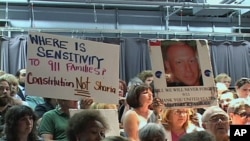American Muslim groups seeking to build mosques or community centers - or even summer camps - have faced suspicion and sometimes organized opposition since the September 11 terror attacks by Islamic extremists 10 years ago.
Some of the fiercest battles have taken place recently in New York City, where a proposal is being considered to build an Islamic community center two blocks from the former World Trade Center site. The plan has sparked protests and angry community meetings.
The issue recently drew national attention, when former vice presidential nominee Sarah Palin called on "moderate" Muslims to oppose the project. A possible Republican presidential candidate in 2012, Mitt Romney, has also expressed opposition to it.
The Muslim group wants to tear down the 153-year-old former warehouse on Park Place, which it has used for Friday prayers for many years. The old building, designed in the style of an Italian Renaissance palazzo, would be replaced with an a sleek, 13-story Islamic prayer and community center. The existing building is not within view of Ground Zero, where terrorists toppled the World Trade Center's twin towers in 2001.
As the building's owner, the group has a right to carry out its plan: The U.S. Constitution prohibits the government from any interference with religion. But that has not stopped an opposition from forming, one made up of people who say that Islam is intrinsically violent, and that the new Islamic center and mosque will be a magnet for some who celebrated the 9/11 attacks.
Pamela Geller leads a group called "Stop Islamization of America." Group supporters demonstrated against the project in lower Manhattan in June.
"We feel that Ground Zero is a war memorial," Geller said during the protest. "It's a burial ground, and it is an offensive idea of a mosque, to put it here, where thousands of people died, where their remains are here. It's humiliating, it's demeaning."
Imam Feisal Abdul Rauf is leading the effort to build the community center and mosque, known as the Cordoba House Building Initiative. The imam has led a mosque near the site since 1983. He argued during a bitter community board hearing that the proposed center will be open to everyone, not only to Muslims.
"We are also mothers and fathers, who have no higher aspiration than to bring up our children whom we love very dearly, as we love your children," he said over shouting opponents.
In an interview, the imam noted the center would function primarily as a cultural center, not a mosque.
"It will have education programs, interfaith programs," he said. "Yes, there will be a prayer space because we pray five times a day. But there will be many other cultural activities which serve the needs of the community."
The imam said opponents suffer from what he calls "Islamophobia," the fear that most Muslims have terrorist sympathies. He notes that at least 60 Muslims also died in the September 11 attacks.
Yet more than half of New York's residents oppose the Islamic center near Ground Zero, including even the one-third of city dwellers who say they have a "generally favorable" view of Islam, according to an opinion poll by Quinnipac University. The percentage of New York residents who oppose the center is even higher in Staten Island and Brooklyn, where many residents have also opposed plans to build mosques in their boroughs.
Dozens of those opponents also took part in another recent community hearing by the Landmarks Preservation Commission. They included Republican Congressman Rick Lazio, who is running for governor of New York State. He told the commission that Imam Rauf has ties to Islamist extremists, something that the imam has strongly denied. Lazio also said that the sources of funding for the building need to be investigated, particularly foreign sources. He and other opponents argued the current building has historical value, too. Part of the landing gear of one of the planes that attacked the World Trade Center crashed through the roof.
"It was part of the attack, a place of deep historical significance and a reminder of just what happened on New York's darkest day," Lazio told the commission.
However, many prominent Christian and Jewish leaders in the city support the project, including New York City Mayor Michael Bloomberg. Mayor Bloomberg told reporters that he had no intention of investigating the Cordoba House initiative's funding or ties.
"I've said that the government should never, never be in the business of telling people how they should pray or where they can pray," the mayor said, "and we want to make sure that everybody from around the world feels comfortable coming here, living here, and praying the way they want to pray."
The commission will rule within weeks. If it finds the building worth preserving for architectural or historical reasons, the owners will have to alter their design. But even a design change won't satisfy opponents. One man who demonstrated in June told a reporter, "It's a spit in our face; go build it uptown somewhere. Don't put it here, of all places, don't put it here. I think al-Qaida's laughing at us."
Supporters say opposition to the center, and to mosques elsewhere in the United States, is rooted in a misunderstanding of Islam. The 9/11 attackers do not represent the beliefs of the world's 1.5 billion Muslims, any more than Christian-identified terrorists represent Christianity. They say more Islamic centers are needed as places where moderate Muslims can forge an American-Islamic identity and build understanding and acceptance.
"A lot of people are telling me what I'm about, that I'm about blowing things up, that I'm about jihad," testified 17-year-old Dania Darwish at the Landmarks Preservation Commission hearing. She's an American Muslim of Syrian descent.
"Do you guys even know what jihad is? No, you don't! Jihad means to sacrifice what's in your heart for Islam. It's not about sacrificing other people. It's about standing up for peace, for interfaith dialogue."
Muslim Group Faces Opposition Near New York's Ground Zero




